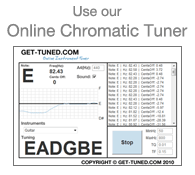Alternate Tunings for the Ukulele
There are several different alternative tunings that are commonly used on the soprano, concert, tenor and baritone ukuleles. It is probable that you will come across music that uses these alternative tunings if you play one of these ukulele types; so it is good to become familiar with these tunings even if you are not planning on using them yourself anytime soon. We encourage you to use our Adjustable Online Ukulele Tuner to help you tune your ukulele to these alternate tunings.
Soprano
Soprano ukuleles are technically supposed to be standard-tuned to A4-D4-F#4-B4, although it is more common these days to see the soprano tuned down to G4-C4-E4-A4 tuning. In the A4-D4-F#4-B4 tuning, each string is tuned one tone higher than with the G4-C4-E4-A4 tuning. It is thought that the slightly higher key produced by A4-D4-F#4-B4 tuning makes the ukulele sound more traditional or Hawaiian. This is because the original Hawaiian ukuleles were a little smaller than the models available today, and so the strings on the earlier instruments were more often tuned ADF#B, as this produced better string-tension. You will likely come across this alternative tuning for the soprano, especially if you delve in to playing traditional Hawaiian music.
You can easily tune your ukulele to ADF#B from GCEA, by using your A-string to tune your G-string up to A. Once your G-string has been tuned up to A you can tune the other three strings up using G-string reference notes (see Tuning the Ukulele to Itself for more information on how to tune using this method). Holding a finger down on the 2nd fret of your tuned-up G-string will produce a reference 'B', and holding down the 5th fret on your tuned-up G-string will produce a reference 'D'. To tune your E-string up to F#, hold down the 4th fret on your B-string (tuned up C-string).
There are many other variations on soprano tuning, which are mainly used to compliment different genres or styles of playing. For example, country musicians tend to borrow ukulele tunings from the tunings or alternative tunings other instruments like the banjo and the mandolin. Secondary alternative tunings are not widely used, unless called for by a particular piece of music or ensemble arrangement. Sometimes soprano ukuleles are tuned out of their re-entrant tuning to increase their range or melodic playability. Fifths tuning is popular for this effect, with the strings tuned G-D-A-E.
Concert
Alternative tunings for the concert ukulele tend to be similar or the same as the soprano alternative tunings, mainly because they are very close in size. The soprano A4-D4-F#4-B4 standard-tuning can be used on the concert ukulele; although it is argued by some ukulele players that the soprano tuning increases the string tension too drastically on a concert model, causing the ukulele to be harder to play with a more tense (rather than a classic 'clangy') sound. When A4-D4-F#4-B4 tuning is used on a concert, it is usually used for the same reasons as it is on a soprano - it is thought that this tuning produces a brighter, clearer tone more suited to playing traditional Hawaiian music. You can tune your concert ukulele up in exactly the same way as you would tune up a soprano ukulele (mentioned above), however its best to ease up on the strings a wee bit; give them more of a chance to adjust to the higher tension and take the up-tuning slowly;, as it will be quite a significant increase in tension because of the increased distance between the nut and the bridge.
Ukuleles have a reasonably long history, and alternative tunings for the instrument have come and gone. The lower key tuning of the concert used to be popular with American ukulele players in the Jazz age, especially for soloist performances. Tuning your concert down to B-flat or A can still be done with pleasing results, but finding music for these tunings is a challenge, as the market is currently dominated by G-C-E-A tuning resources.
Other variations of concert tuning tend to follow the same mold as with the soprano, with alternative tunings being used mainly to complement different styles or genres of music or different ensembles. The concert ukulele can be tuned in fifths also, with the tuning of: C-G-D-A. Again the same reasons as for the fifth tuning of the soprano can be cited - fifth tuning allows for easier melodic playability.
Tenor
The tenor ukulele is slightly bigger than the concert ukulele, and it has a significantly longer fretboard. The tenor ukulele has two G-C-E-A tunings, known commonly as high-G and low-G tuning. High-G tuning is the same tuning as the concert and soprano (G4-C4-E4-A4). Critics of the high-G tuning state that the body of the tenor is not suited to producing the high re-entrant ukulele sound, although high-G tuning is very popular and many newly manufactured tenor ukuleles are strung with all-nylon strings to accommodate high-G tuning. Low-G tuning is tuned with the G-string an octave lower (to G3). Low-G tuning is criticized for its lack of traditional ukulele sound, as it forgoes the re-entrant tuning and sounds more full-bodied, like a guitar. Low-G tuning has its advantages however, and many ukulele soloists prefer the low-G tuning as it allows for a greater melodic range, and some fingerpicking skills are definitely more transferrable between the guitar and the low-G tenor ukulele. Low-G tuned tenor ukuleles often have a metal wound G-string, which produces a deeper more mellow sound than the harshness of re-entrant tuned ukuleles.
There are a few other alternative tunings for the tenor ukulele, however these are much rarer than the high-G and low-G tunings. With the right strings the tenor can be tuned down to D-G-B-E (like the baritone ukulele) and occasionally the low-G string may be tuned down to a C to produce a greater tonal range. Tenor ukuleles can also be tuned in fifths or fourths if desired, however these tunings aren't overly common.
Baritone
The standard tuning of the baritone ukulele is non-reentrant. The strings are tuned D3-G3-B3-E4 from low to high, which is exactly the same tuning as the top four strings of the guitar. Some ukulele purists don't think the baritone should be classified as a ukulele for this reason. This is perhaps the main reason why the baritone is alternatively tuned to re-entrant tuning. The baritone can be alternatively re-entrant tuned to G-C-E-A (in accordance with the other three ukulele types), or to D-G-B-E, with the D string an octave higher than non-re-entrant tuning. The G-C-E-A tuning of the baritone ukulele requires a different set of strings to the baritone strings used for standard-tuning, and the high-D tuning of the baritone ukulele requires a different D-string. Some models of baritone ukulele are sold with re-entrant tuned strings, however these models are much rarer than those baritone ukes that are sold tuned to the standard D-G-B-E tuning.














xapkshop.com
<a href="https://xapkshop.com">app download</a>
xapkshop.com
<a href="https://xapkshop.com">Apk download</a>
xapkshop.com
<a href="https://xapkshop.com">android apk</a>
xapkshop.com
<a href="https://xapkshop.com">android app</a>
xapkshop.com
<a href="https://xapkshop.com">Apk download</a>
xapkshop.com
telegram APk Download https://xapkshop.com/details/1522601987
I would like to tune a ukulele to E A D G. I want to use it for playing bass guitar parts on a small acoustic instrument. Can anyone tell me what the best size (mm) strings would work for that?
Online ukulele tuner for Alternate ukulele tunings
This online ukulele tuner offers 13 different ukulele tunings. Standard and many alternates. https://ukesong.com/online-ukulele-tuner/
Worth having a look
How about tuning GDAE like a mandolin?
May help with broader range
I'm contemplating changing the tuning of my low G Joe to F C E A.
Has anyone here had any experience with this tuning on concert uke? I'm doing more fingerstyle, and it would be nice to reach down to that F when playing with other musicians.
Any thoughts to pros and cons? Obviously, it would affect chord shapes. Please reply.
I play baritone ukulele in standard guitar tuning. I also have a concert ukulele banjo in standard ukulele tuning. Unfortunately when playing the banjo I forget myself and start playing guitar chords much to the chagrin
of other members of the group. Is it possible to restring and tune the banjo to guitar tuning?
I play baritone ukulele in standard guitar tuning. I also have a concert ukulele banjo in standard ukulele tuning. Unfortunately when playing the banjo I forget myself and start playing guitar chords much to the chagrin
of other members of the group. Is it possible to restring and tune the banjo to guitar tuning?
High C pain
This is a fab site for learning how to tune a ukulele, including alternate tuning. The only variation I can’t find here is how to tune my 8 string ukulele’s high C. Got the other 7, but currently my thin c string is tuned down to low c and is loose and a little buzzy. I am unsure if I should keep winding it up till it hits c again on my chromatic tuner. Any help would be much appreciated. Thanks.
The higher tuning, ADF#B, was in response to early phonograph recordings to produce a brighter tone. Early steel guitars (originally DGDGBD) were tuned up to EAEAC#E for the same reason. The ukulele craze of the 1920s here on the mainland adopted the higher tuning, while in Hawai'i, the original tuning survived.
l have received ukulele strings g4d3a2e1 what is this tuning can it be used on a uke
l have received ukulele strings g4d3a2e1 what is this tuning can it be used on a uke
I have my Tenor Uke tuned to
dGBE using original strings i.e. gCEA.
I have had to keep re-enterant tuning, as the g string is too soggy when dropped to D
I like the sound, and it's easier on the fingers
What kind of strings do I need for a tenor to tune gbda like a baritone
tenor banjo with uke fingering
string inches tone string type
1 0,025 G3 wounded, phosofor brons
2 0,016 C4 plain steel
3 0,012 E4 plain steel
4 0,009 A4 plain steel and your tenor banjo works like a ukulele fingering but with the banjo sound
I am currently using a tenor ukulele and my tuning is DGBE it works :)